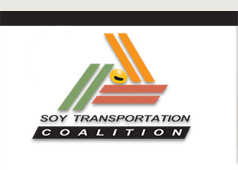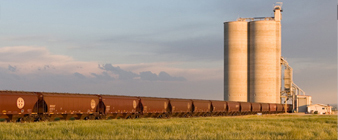 |
 |
|
| eNews • September 2014 | ||
| Promoting a Cost-Effective, Reliable and Competitive Transportation System |
||
 US grain exporters welcome ILWU contract but rail delay concerns persist
US grain exporters welcome ILWU contract but rail delay concerns persist
U.S. grain shippers are welcoming the International Longshore and Warehouse Unionââ¬â¢s collective bargaining agreement with Pacific Northwest grain handlers, but they are still concerned about poor rail service that is hampering their ability to get exports to Asia.
The ratification of a new four-year agreement between the ILWU and three large grain exporters - Louis Dreyfus Commodities, United Grain Corp. and Columbia Grain - will enhance the predictability of grain shipments, Mike Steenhoek, executive director of the Soy Transportation Coalition, said in an email. With fierce competition from South American producers, U.S. farmersââ¬â¢ ability to deliver on their export commitments is increasingly important, he said. The agreement, which was announced on Aug. 12 but wasnââ¬â¢t ratified by the union until this week, is expected to bring a close to a fierce, two-year battle between both sides and allow the ILWU to focus on negotiations with U.S. West Coast waterfront employers.
The Pacific Northwest region is the second-largest U.S. export gateway for soybeans and other grains, following the Gulf Coast via the Mississippi River, Steenhoek said. The Pacific Northwest ports last year handled 25 percent of all soybean exports, 13 percent of outbound corn shipments and 35 percent of wheat exports, he said.
But ââ¬Å"the remaining and looming concern is the anticipated rail service challenges between the western states - North Dakota, South Dakota, Minnesota, Nebraska, etc. - and the Pacific Northwest,ââ¬Â Steenhoek said. ââ¬Å"Given the projected 2014 harvest and the anticipated inability of our freight rail system to absorb this harvest, we believe the situation can accurately be described as trying to attach a garden hose to a fire hydrant.ââ¬Â
BNSF Railway and Canadian Pacific Railway say they are working to improve service as the 2014 harvest starts to move from farms to grain elevators. A backlog of shipments caused by a harsh 2013-2014 winter, coupled with an increase in intermodal and carload freight, has resulted in some grain shippers waiting more than a month for rail service. Both railroadsââ¬â¢ networks have been further tested by a surge of oil, frac sand and other shipments tied to oil and natural gas production in the Bakken Shale region. The rail delays ripple down the supply chain, reducing the amount of grain that can be transloaded into containers and shipped on the backhaul to Asia.
BNSF spokesman Amy Casas reiterated the railroadââ¬â¢s belief that it will ââ¬Å"perform better year than last,ââ¬Â and said that past due order for railcars have been reduced by more than 80 percent since March. The number of unfulfilled grain railcar shipments fell by 62 orders, or 2.3 percent, in the week ending Aug. 21 compared to the prior week, according to a BNSF filing to the U.S. Surface Transportation Board, the U.S. rail regulatory agency. In the week ending Aug. 21, the average grain shipper was waiting 12.9 day for service, compared with 17 days in the week before.
CP has added new locomotives to better serve shippers in North Dakota and Minnesota, according to the railroadââ¬â¢s Aug. 22 letter to the STB. The railroad said it has removed more than 16,256 open requests from its order system, as it works to better determine just how many more railcars need to moved and how many are ââ¬Å"phantom requests.ââ¬Â
ââ¬Å"From now to harvest, we plan to continue to outstrip new requests by a significant margin as we have done since reporting commenced,ââ¬Â Robert Johnson, CP senior vice president of operations, wrote in the letter. ââ¬Å"Furthermore as we transition to our new system, we expect a 15 percent to 20 percent improvement in our ability to move grain into the fall harvest.ââ¬Â
Both railroads are under increased pressure from Washington, D.C., to move grain faster. The STB will hold a public hearing on how rail service delays are hurting grain shippers in Fargo, North Dakota, on Sept. 4. The hearing comes after the STB directed BNSF and CP in late July to provide weekly updates on backlogged grain shipments. Sens. John Hoeven and Heidi Heitkamp, both of North Dakota, have met with CP and BNSF executives in an effort to encourage them to move grain loads faster.
Source: Journal of Commerce
Soy Transportation Coalition |
|
